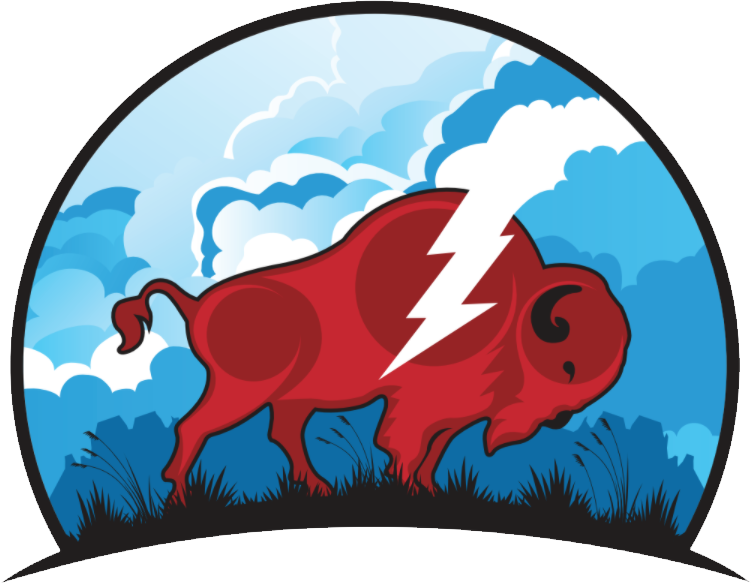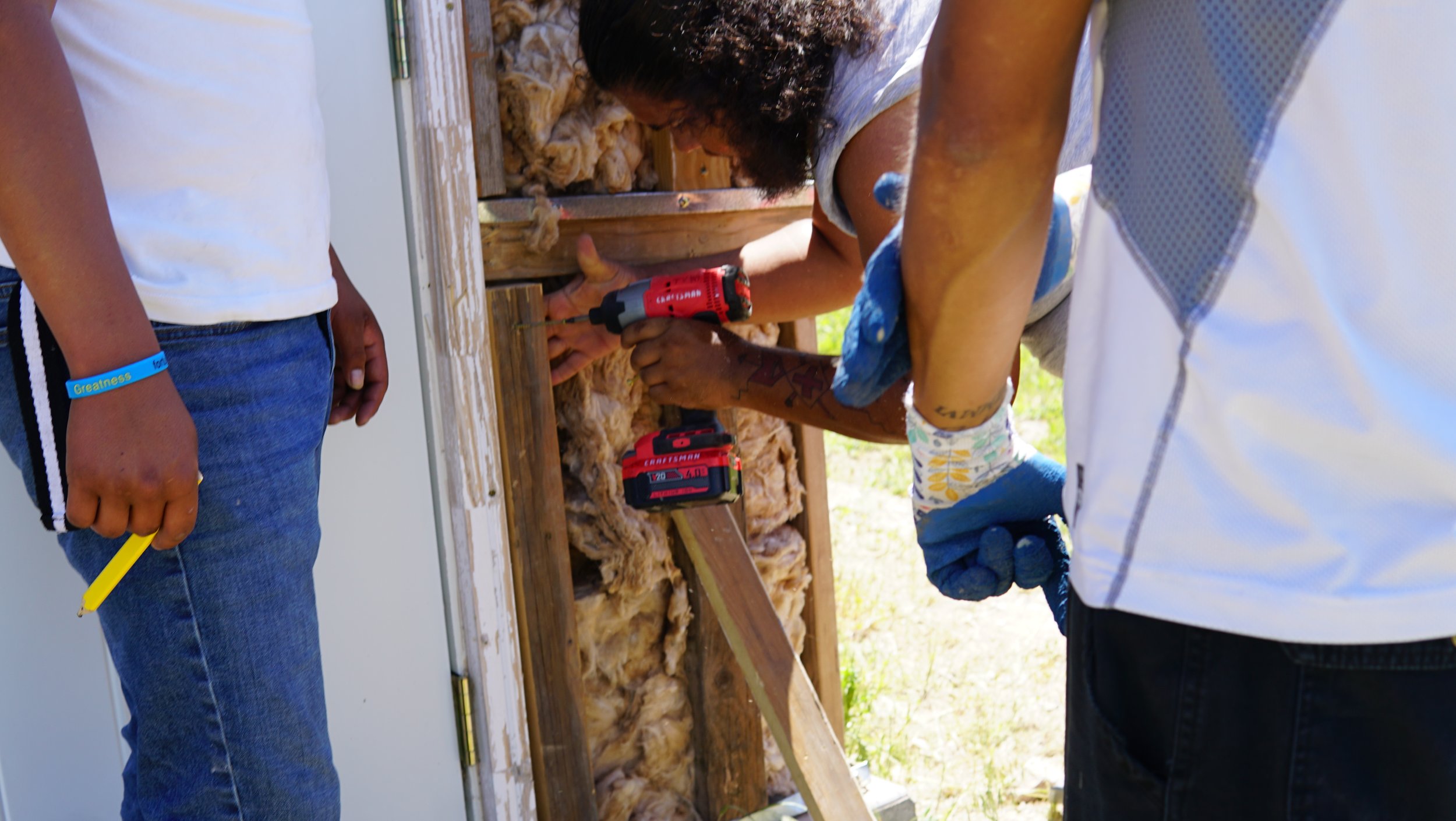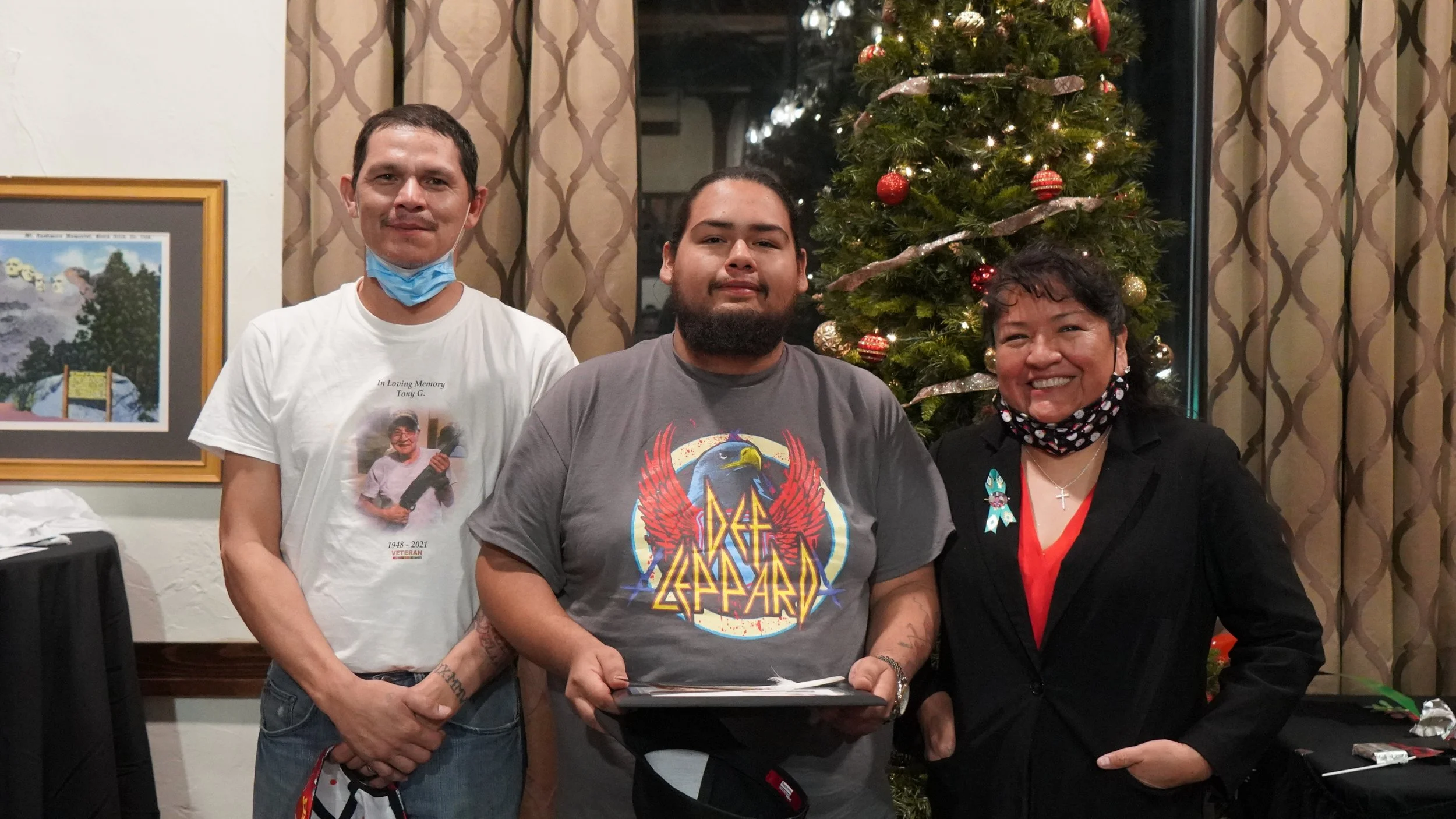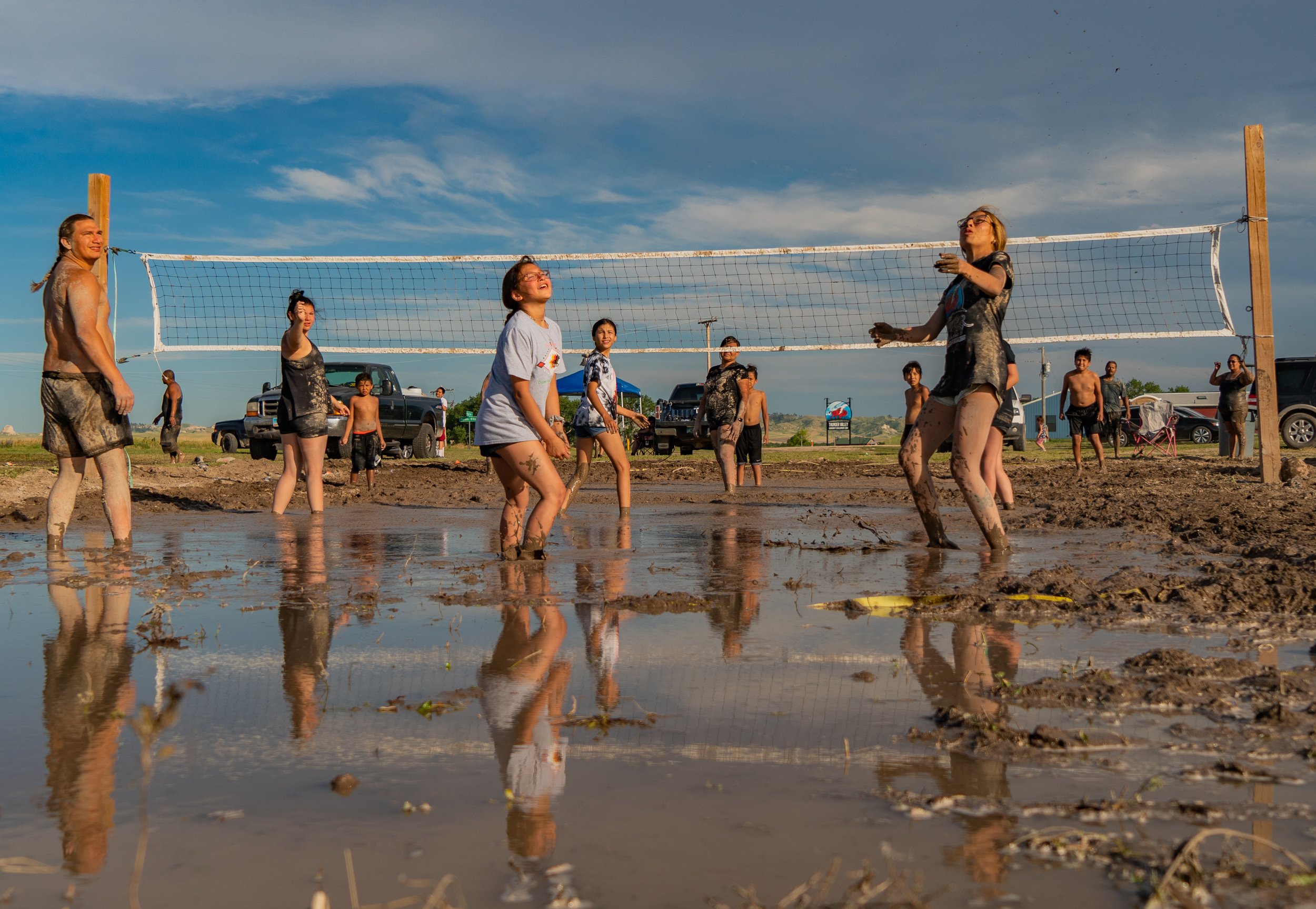
annual report
2021 & 2022
Walking the path of Healing, hope and Liberation
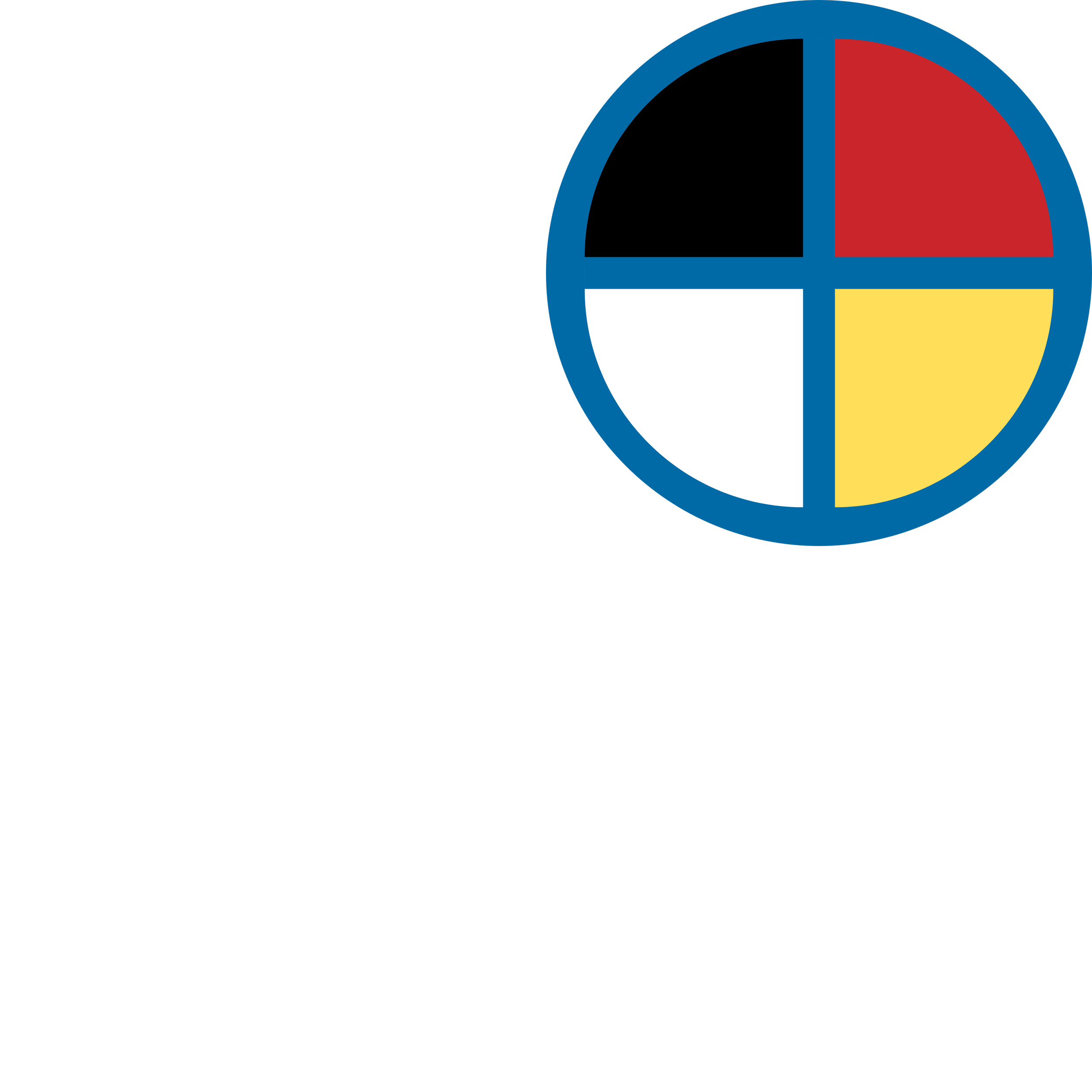
Letter from the Executive Director:
We are excited to share this update on the work we’ve been able to do with your support. Last year was pivotal for Thunder Valley, starting with our rebrand in March. Our understanding of and approach to the work we do has evolved, and we wanted to describe and to celebrate the new path we’re walking.
At Thunder Valley, all of our work is focused on the liberation of the Lakota Oyáte, on our freedom and our responsibility to be our sovereign selves. To do this, we created a Lifeways & Wellness Equity to ensure that the work of our eight initiatives is rooted entirely in our traditional lifeways, dedicating three full-time staff members to the healing journey of our community
Theda Clarke, Russell Means and others protesting the Whiteclay liquor stores in 1999
At the end of 2021, we made another crucial step towards healing. We purchased 48 acres in Whiteclay Nebraska, a town of about a dozen people and four liquor stores that for years sold millions of cans of beer to our Oyáte (our nation) every year.
Many of us at Thunder Valley are the čhuŋkší, čhiŋkší na tȟakóžas, the daughters, the sons and the grandchildren, of the American Indian Movement. As children of revolutionaries, it is up to us to carry on their work in our own way. I remember the protests in 1999, when my father, Russell Means, marched with Frank LaMere and so many others on Whiteclay, knowing that they’d face police in riot gear.
After years of poisoning our community, the beer stores were closed in 2017 by the Nebraska Liquor Control Commission. On this land we will develop permanent and transitional housing for healing, building a community of care that safely keeps those relatives most affected by the legacy of alcoholism Whiteclay fed close to the resources they need to heal.
We are changing the narrative of Whiteclay, replacing a site of oppression with a starting point on the pathway of healing, hope and liberation.
Like them, we must be courageous in our vision for the future, and we are grateful for all that they did to make a better life for our children. So too are we grateful for those allies from other nations who helped return Whiteclay to our people and lay out a path by which it can become a place of healing: Frank LaMere (Hochunk) and John Maisch worked tirelessly for years to end the injustice of Whiteclay. Though both have now passed, their spirits and their courage continue to have a healing influence in our community.
We follow the path walked by our ancestors: the path of liberation for our Lakota Oyáte, walking towards our freedom and our responsibility to be our sovereign selves.
Tatewin Means, JD
Executive Director
We are changing the narrative of Whiteclay, replacing a site of oppression
with a starting point on the pathway of healing, hope and liberation
2022 Child Honoring
We gathered to celebrate our children and honor them at the end of the school year, with our sacred foods and our youngest in the center, surrounded by loving adults in a truly Lakota space

This annual report covers both 2021 and 2022, highlighting key events and milestones and placing them in context of our intergenerational movement for freedom. This report will explore healing, hope and liberation in the following aspects of our everyday work:
Our first Elder Retreat, a gathering for our most knowledgeable living relatives to speak our Lakota language with other first-language speakers and share the stories of how they were raised
Our growing Financial Stability, as we get closer to our goal of insulating our essential work from the fluctuations of grant cycles by developing a reserve fund and corresponding investment plan
Our many responses to the COVID-19 Pandemic, including:
Meeting material needs with care kits for isolated elders and youths, containing cleaning supplies, coffee and more
Serving social and spiritual needs by hosting Ohunkankan Elder Storytelling Sessions, bringing relatives of all ages together virtually to participate in our traditional winter storytelling
Initiating the network that would grow into an autonomous Women’s Equity Movement, a coordinated group of women and men advancing gender equity by restoring traditional women’s societies within and across our communities
Our successful advocacy, writing and adoption of an Advisory Youth Seat on the Oglala Sioux Tribal Council, to literally give our younger relatives a seat at the table
Our New Brand Identity and what it means for our work and our community
We honored our board members with star quilts at our end of year dinner in 2021. They are, from left to right, Beau LeBeaux (president), Genevieve Dement-Osborn (treasurer), Trenton Old Horse (vice president), Gary Pourier Sr. and Bill Means
Inaugural Elder Retreat
Answering the request of an organizing group of Lakota elders, we hosted a new annual Elder Retreat from October 24 to 28th, 2022. The purpose of these retreats is to reclaim our educational sovereignty and ensure that every child in every family in our community can live with our language and our lifeways far into the future. The theme for these retreats has been the question, “What will our legacy be?”
We provided over 40 elders with rooms at K Bar S Lodge in Keystone, SD to be together with peers who, like them, speak our Lakota language as their first language. Our elders carry essential wisdom that guides us as we work to revitalize our language. We took an indirect path to ask for their guidance for curriculum development, asking for stories from their youth to understand how they were raised.
Our goal is to return to the foundation, relying on our elders’ lived experiences as education and the driving force in developing our curriculum for the planned Lakota Living Learning Space. We are reimagining Indigenous education for Lakota children and grateful to the elders joining us to create curriculum, standards and education.
One attendee said it best, “I feel at home with other elders and speaking Lakota. We shared our experiences knowing that it will be used for the betterment of our grandchildren's future to learn and use in this education.”

Sharing food after an elder-led traditional food session at our Second Annual Lakota Food Summit in 2022
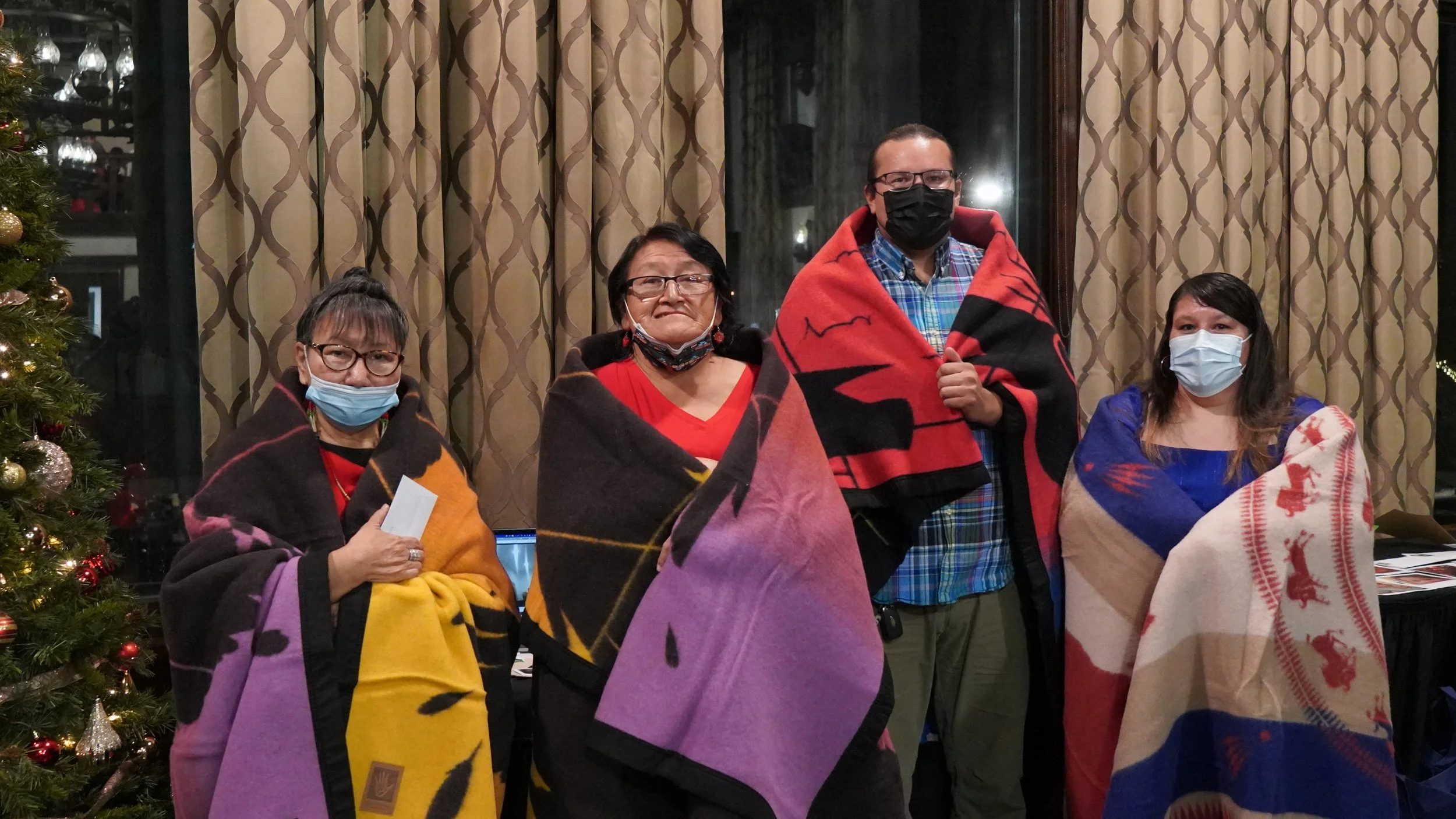
Employees of the year for 2021, from left to right: Unci Verine White, Unci Martha American Horse, Dallas Nelson, and Victoria Shoulders

Doyle Pipe on Head, Director of Social Enterprise, during an ice breaking activity at a suicide prevention training

Unci Martha American Horse sharing a story with some young relatives
Financial Stability
These two years saw us take great strides in ensuring the financial stability of our organization. While not glamorous, financial stewardship ensures that the people doing the work of liberation can focus on their work, rather than spending their time chasing grants. With a multi-year matching grant from the sunsetting Kendeda Foundation, we have established an investment plan, received the support of our board and created an operating reserve equal to half a year’s budget.
We would like to thank the Kendeda Foundation along with other supporters. MacKenzie Scott gave a generous, one-time gift that helped further this work. We are particularly grateful for the flexibility and trust shown by their support. We work directly in our community, and often we see that grants with strict parameters or onerous reporting processes take time and energy away from the work, or redirect in a way that funders are familiar with even when that is not a great fit for the community.
Unrestricted gifts and dialogue-based partnerships that span years offer a balance of flexibility and stability, and demonstrate the mutual respect that is the foundation of solidarity.

covid-19 Pandemic Response
Throughout the pandemic, we have met, and often exceeded, CDC and tribal guidelines to keep our staff and our community safe. We safely returned to the office in March 2021, still prioritizing virtual meetings and providing free, quality masks to staff to limit transmissions and ensure safety. Over time, we were able to host more in person events, always mindful to use outdoor spaces when appropriate and maintain good airflow.
From the start of the pandemic, we have participated in the Indigenous Response Network. Collaborating with community partners, we delivered hundreds of care kits (containing food, cleaning supplies and coffee) to elders and youth all across our Reservation. For youth kits, we also provided basketballs, soccer balls and an assortment of coloring and puzzle books.
The Indigenous Response Network quickly grew beyond care kits. The connections and partnerships forged in the pandemic shaped the growing Women’s Equity Movement. Having established processes for meeting community needs, we realized that we could use the same network to address another pandemic: violence against Indigenous relatives, particularly women. We are restoring our traditional women’s societies to revive the role of women in our leadership.
By developing deeply supportive and active groups of women, we provide resources and tools for girls and women to organize together, to learn about healthy relationships and to share community. In 2021 and 2022 we hosted several organizing meetings and convenings across the districts of the Reservation and in Rapid City.
COVID isolation was especially acute in our community due to how spread out our population is. The same network that prompted the Women’s Equity Movement hosted Ohunkankan Elder Storytelling sessions in the winters of both 2021 and 2022. This now annual series uses the virtual meetings to make a traditional practice more accessible.
Before colonization and the Reservation system, winter was the season of stories, elders narrating around fires for families staying warm together. These stories nourished and guided the people, and were a crucial part of our educational practices. We hosted dozens of sessions for hundreds of people, transmitting knowledge safely and fostering connections between our elders and our youth. This work is important because many of our youth don’t have regular opportunities to hear stories like these, and because it offers a safe, cultural space without spreading COVID.
Above: A scene from a Women’s Equity Movement meeting on the crisis of Missing and Murdered Indigenous Women and Relatives
Below: A flyer from the 2022 Elder Led Storytelling series, Pheta Ka’ilepi (Rekindling the Fire)
Thunder Fest
2021
At our third annual music festival, in addition to the celebration of Indigenous talent and the sharing of a meal, we hosted a COVID-19 Vaccine to ensure that every relative had an easy chance to get vaccinated!
Workforce Development: Cohort 7
Above: Micoda Little Eagle at the 2021 Workforce Development program graduation ceremony. Left, Anthony “TD” Garnette - Construction Trainer; Center, Micoda Little Eagle; Right, Lynette Kills Back - Workforce Development Director
Youth Highlights
Our children are sacred. Because of their youth they hold a special connection to the spirit world. This connectedness gives them an intuitive sense of how to live together as relatives. We, adults, have a lot to learn from our children and the youth in our community, and we value the insights they can offer.
The Oglala Sioux Tribe passed a resolution on January 27th, 2022 to adopt the Oglala Youth Society Model, as written by our Youth Leadership Initiative, to include a non-voting Youth Advisory Seat to the Tribal Council, stemming from the Oglala Youth Society Project that we created. The Oglala Youth Society will appoint two Youth Legislators from every district to the Oglala Youth Society. Youth will then vote their officers in and those vacant seats will be replaced by additional members of the Oglala Youth Society.
We formed another youth-focused tribal partnership in 2022. Invited to apply for a grant from the Day 1 Families Fund, the tribe asked for our help to submit and facilitate the grant. This resulted in a $5,000,000 grant to build a shelter for unhoused youths, the design of which we are coordinating with ICON, an Austin, TX based architectural firm that uses innovative 3D printing construction techniques to build unique homes.
As with all of our design work, we plan extensive community outreach and engagements to ensure that we are building according to the values and needs of our Oyate. The shelter will be built in Kyle, just up the road from our development at Thunder Valley.

Rebrand
We thank you for reading this update on the work we’ve been able to do with your support. 2021 and 2022 was a pivotal time for Thunder Valley, starting with our rebrand in March of 2021. Our understanding of and approach to the work we do has evolved, and we wanted to describe and to celebrate the new path we’re walking.
At Thunder Valley, all of our work is focused on the liberation of the Lakota Oyáte, on our freedom and our responsibility to be our sovereign selves. To do this, we created a Lifeways & Wellness Equity team to ensure that the work of our eight initiatives is rooted entirely in our traditional lifeways, dedicating three full-time staff members to the healing journey of our community.
The transformation begins with healing, which leads to hope, and ultimately liberation. Wakíŋyaŋ Opȟá Wičhóthi Gluíčhaǧa Okȟólakičhiye (Thunder Valley CDC) began when community members came together and decided to change things, and each year our commitment grows to community-led change.
As we move forward with liberated and liberating mindsets, we are guided by four core beliefs:
We find strength in our Lakȟól wičhóȟʼaŋ. We root our work in our traditions and our traditions are woven through all that we do.
Liberation happens in the interplay between the individual and the community. For Liberation to be realized, we must individually and collectively shift our mindsets and worldview to once again think and live Lakȟóta. Each individual must be sovereign, self-determined, and liberated. This then extends to the thiwáhe (the family), the thiyóšpaye (the extended family unit) and eventually the entire oyáte (nation).
Healing leads to hope. The first step in our work is awakening. Once awake we can heal, face our oppression and step more deeply into our traditions, creating the foundation for all our work and hope for the future.
We aim to be good relatives. We are all connected. We do this work for our children, for our elders, for all our relatives past, present and future. We also collaborate with other organizations, communities and individuals, working side by side towards liberation.
During these two years, we have grown so much as an organization. We went from 7 houses with families in them to 12 family-filled homes. We shared our new brand identity and filled the Lifeways and Wellness Equity team that is so central to our new way of doing the work. We have learned lessons and shared knowledge, cultivated new and innovative partnerships to better serve our communities and we have been helped at every step by our relatives, our allies and our supporters.
Our development is a pivotal site of change for our community. We believe in the spirit of generosity that has guided our work for decades, from even before our incorporation as a non-profit. We believe in our oyáte and in Wakíŋyaŋ Opȟá, "the place the thunder beings through". Our home may have its storms, but this same energy fuels us as we walk forward in healing, hope and liberation.
As we continue down this path of liberation, we are humbled by your company and grateful for your support. We take a whole-community approach to our work because we know that this work cannot be done alone.
